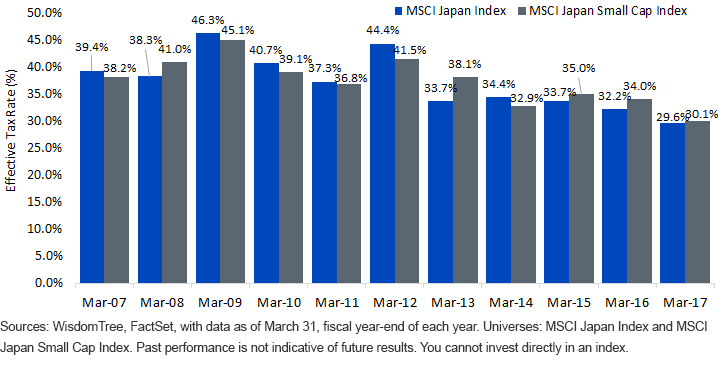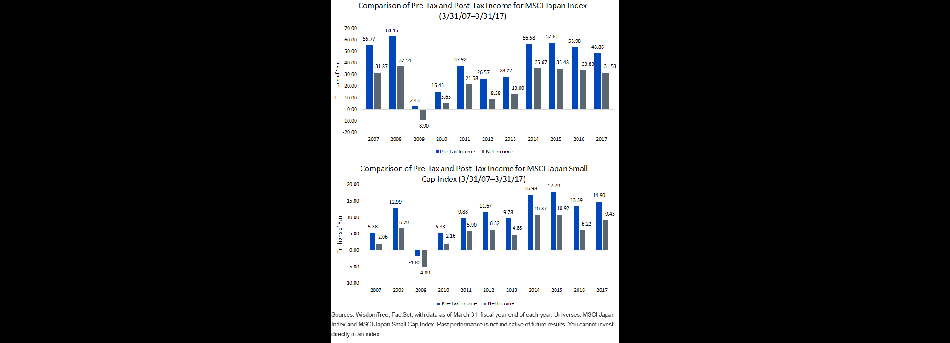Corporate Tax Cuts: Taking a Page from the Japanese Playbook


One of the biggest discussions in the U.S. market in 2017—particularly in the fourth quarter—concerned corporate taxes. While the earnings growth that comes from the cut in corporate tax rates to 21% will play out in 2018 and beyond, we can look at how Japanese earnings responded to the lowering of corporate tax rates that came with Abenomics.
U.S. equity markets have been reacting to the ebb and flow of different corporate tax-related announcements, but we believe that non-Japanese investors might not even realize the magnitude of the corporate tax cuts that Japan has already experienced.
Over the Last 10 Years, Effective Tax Rates in Japan Have Fallen Approximately 10%
Japan Effective Corporate Tax Rates (FY 2007–2017)

Please visit our glossary for definitions of indexes in the chart.
- We must recall that Prime Minister Shinzo Abe’s first election victory occurred on December 16, 2012. For Japan’s fiscal year ended March 31, 2012, the effective tax rate for the MSCI Japan Index constituents was more than 40%. The current level—29.6%—represents a massive difference.
Have Profits Responded to Lower Taxes in Japan?
This is the true question for an equity investor, as lower taxes are nice, but the investment decision focuses on the profit response.
There Seems to Be an “Abenomics Response” to Both Pre-Tax and After-Tax Income

- MSCI Japan Index (Large Caps): For the fiscal years that ended in 2014, 2015, 2016 and 2017, we can note that revenue (not shown) was only about 7.9% higher on average than for the fiscal years that ended in 2010, 2011, 2012 and 2013.1 However, pre-tax income was approximately 100% higher, on average, and after-tax income was approximately 179% higher. We certainly wouldn’t say that tax rates were the sole driver—things such as the yen exchange rate also mattered—but they were definitely a factor.
- MSCI Japan Small Cap Index (Small Caps): For the fiscal years that ended in 2014, 2015, 2016 and 2017, we can note that revenue (not shown) was only about 26% higher, on average, than in the prior four fiscal years.2 However, pre-tax income was almost 100% higher, and net income was, on average, more than 70% higher. The yen exchange rate would have been less important here, as these firms would engage in far less exporting than those within the MSCI Japan Index.
New Policy “Arrows”: Further Incentives May Help Companies Lower Their Tax Burdens over the Next Three Years
On December 14, Japan’s government announced a set of further incentives that could help corporations pay effective tax rates as low as 20%, even if the broader statutory rates remained unchanged.3
- Big companies can potentially cut their effective tax rate to around 25% (from 29.74%) if they raise wages by more than 3% and expand investment on fixed assets and human resources.
- Small and medium-sized businesses have it a bit easier, only needing to raise wages 1.5% and not having a fixed investment requirement in order to qualify for the tax break.
- Further tax breaks for firms are available—possibly bringing their effective rates closer to 20%—if investments in technologies related to the Internet of Things are made and are associated with rising productivity.
Abenomics Has Been About More Than a Weaker Yen
We think it’s a trap to look at Japan, then look at the level of the yen and use solely that to judge whether Abenomics has been successful. As with any government policy, some facets have been more impactful than others and none of it can be said to be “perfect,” but there have been some very positive changes if you know where to look.
Foreign Investors Should Appreciate Japan’s Potential
In 2017, foreign investors placed about $3.7 billion4 in net inflows into Japan’s equity market. We’d note that this country has some of the best alignment between the fiscal and monetary authorities that one can find, and they have not been shy about attempting reforms. Corporate taxes are a big topic these days, and we look forward to seeing how these new incentives will shift the picture for Japan’s equities going forward.
1Sources: WisdomTree, FactSet, with data as of March 31, fiscal year-end of each year. Universe: MSCI Japan Index. You cannot invest directly in an index.
2Sources: WisdomTree, FactSet, with data as of March 31, fiscal year-end of each year. Universe: MSCI Japan Small Cap Index. You cannot invest directly in an index.
3Source: Shotaro Tani, “Japan Plans a Tax Incentive to Encourage Wage Hikes,” NIKKEI Asian Review, 12/21/17.
4Source: Bloomberg, 12/22/17.
Important Risks Related to this Article
Investments focused in Japan increase the impact of events and developments associated with the region, which can adversely affect performance.

Christopher Gannatti began at WisdomTree as a Research Analyst in December 2010, working directly with Jeremy Schwartz, CFA®, Director of Research. In January of 2014, he was promoted to Associate Director of Research where he was responsible to lead different groups of analysts and strategists within the broader Research team at WisdomTree. In February of 2018, Christopher was promoted to Head of Research, Europe, where he was based out of WisdomTree’s London office and was responsible for the full WisdomTree research effort within the European market, as well as supporting the UCITs platform globally. In November 2021, Christopher was promoted to Global Head of Research, now responsible for numerous communications on investment strategy globally, particularly in the thematic equity space. Christopher came to WisdomTree from Lord Abbett, where he worked for four and a half years as a Regional Consultant. He received his MBA in Quantitative Finance, Accounting, and Economics from NYU’s Stern School of Business in 2010, and he received his bachelor’s degree from Colgate University in Economics in 2006. Christopher is a holder of the Chartered Financial Analyst Designation.

